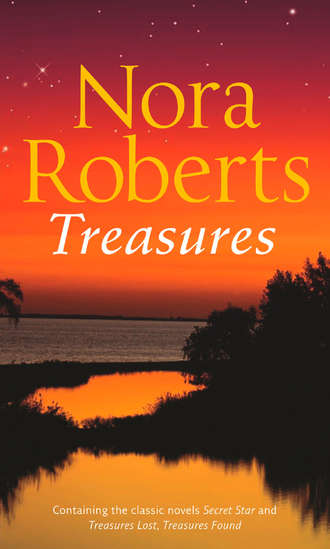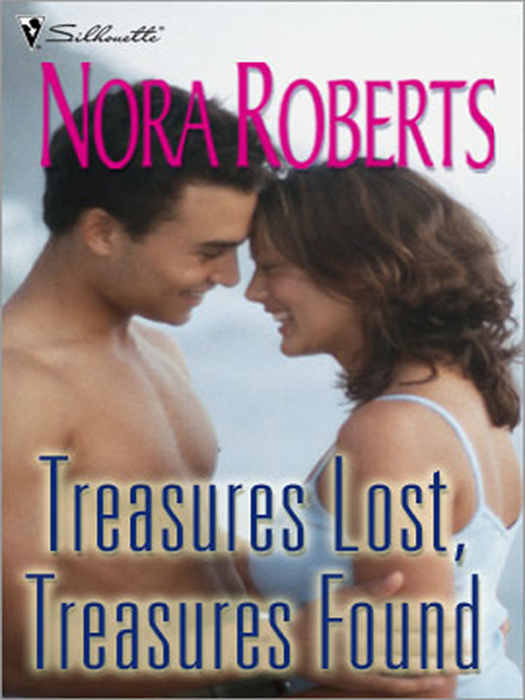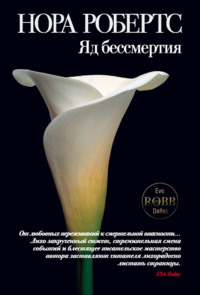
Полная версия
Treasures Lost, Treasures Found: the classic story from the queen of romance that you won’t be able to put down


Nora Roberts
Treasures Lost, Treasures Found

To Dixie Browning,
the true lady of the island.
CONTENTS
CHAPTER 1
CHAPTER 2
CHAPTER 3
CHAPTER 4
CHAPTER 5
CHAPTER 6
CHAPTER 7
CHAPTER 8
CHAPTER 9
CHAPTER 10
CHAPTER 11
CHAPTER 12
Chapter 1
He had believed in it. Edwin J. Hardesty hadn’t been the kind of man who had fantasies or followed dreams, but sometime during his quiet, literary life he had looked for a pot of gold. From the information in the reams of notes, the careful charts and the dog-eared research books, he thought he’d found it.
In the panelled study, a single light shot a beam across a durable oak desk. The light fell over a hand—narrow, slender, without the affectation of rings or polish. Yet even bare, it remained an essentially feminine hand, the kind that could be pictured holding a porcelain cup or waving a feather fan. It was a surprisingly elegant hand for a woman who didn’t consider herself elegant, delicate or particularly feminine. Kathleen Hardesty was, as her father had been, and as he’d directed her to be, a dedicated educator.
Minds were her concern—the expanding and the fulfilling of them. This included her own as well as every one of her students’. For as long as she could remember, her father had impressed upon her the importance of education. He’d stressed the priority of it over every other aspect of life. Education was the cohesiveness that held civilization together. She grew up surrounded by the dusty smell of books and the quiet, placid tone of patient instruction.
She’d been expected to excel in school, and she had. She’d been expected to follow her father’s path into education. At twenty-eight, Kate was just finishing her first year at Yale as an assistant professor of English literature.
In the dim light of the quiet study, she looked the part. Her light brown hair was tidily secured at the nape of her neck with all the pins neatly tucked in. Her practical tortoiseshell reading glasses seemed dark against her milk-pale complexion. Her high cheekbones gave her face an almost haughty look that was often dispelled by her warm, doe-brown eyes.
Though her jacket was draped over the back of her chair, the white blouse she wore was still crisp. Her cuffs were turned back to reveal delicate wrists and a slim Swiss watch on her left arm. Her earrings were tasteful gold studs given to Kate by her father on her twenty-first birthday, the only truly personal gift she could ever remember receiving from him.
Seven long years later, one short week after her father’s funeral, Kate sat at his desk. The room still carried the scent of his cologne and a hint of the pipe tobacco he’d only smoked in that room.
She’d finally found the courage to go through his papers.
She hadn’t known he was ill. In his early sixties, Hardesty had looked robust and strong. He hadn’t told his daughter about his visits to the doctor, his check-ups, ECG results or the little pills he carried with him everywhere. She’d found his pills in his inside pocket after his fatal heart attack. Kate hadn’t known his heart was weak because Hardesty never shared his shortcomings with anyone. She hadn’t known about the charts and research papers in his desk; he’d never shared his dreams either.
Now that she was aware of both, Kate wasn’t certain she ever really knew the man who’d raised her. The memory of her mother was dim; that was to be expected after more than twenty years. Her father had been alive just a week before.
Leaning back for a moment, she pushed her glasses up and rubbed the bridge of her nose between her thumb and forefinger. She tried, with only the desk lamp between herself and the dark, to think of her father in precise terms.
Physically, he’d been a tall, big man with a full head of steel-gray hair and a patient face. He had favored dark suits and white shirts. The only vanity she could remember had been his weekly manicures. But it wasn’t a physical picture Kate struggled with now. As a father…
He was never unkind. In all her memories, Kate couldn’t remember her father ever raising his voice to her, ever striking her. He never had to, she thought with a sigh. All he had to do was express disappointment, disapproval, and that was enough.
He had been brilliant, tireless, dedicated. But all of that had been directed toward his vocation. As a father, Kate reflected…He’d never been unkind. That was all that would come to her, and because of it she felt a fresh wave of guilt and grief.
She hadn’t disappointed him, that much she could cling to. He had told her so himself, in just those words, when she was accepted by the English Department at Yale. Nor had he expected her ever to disappoint him. Kate knew, though it had never been discussed, that her father wanted her to become head of the English Department within ten years. That had been the extent of his dream for her.
Had he ever realized just how much she’d loved him? She wondered as she shut her eyes, tired now from the hours of reading her father’s handwriting. Had he ever known just how desperately she’d wanted to please him? If he’d just once said he was proud…
In the end, she hadn’t had those few intense last moments with her father one reads about in books or sees in the movies. When she’d arrived at the hospital, he was already gone. There’d been no time for words. No time for tears.
Now she was on her own in the tidy Cape Cod house she’d shared with him for so long. The housekeeper would still come on Wednesday mornings, and the gardener would come on Saturdays to cut the grass. She alone would have to deal with the paperwork, the sorting, the shifting, the clearing out.
That could be done. Kate leaned back farther in her father’s worn leather chair. It could be done because all of those things were practical matters. She dealt easily with the practical. But what about these papers she’d found? What would she do about the carefully drawn charts, the notebooks filled with information, directions, history, theory? In part, because she was raised to be logical, she considered filing them neatly away.
But there was another part, the part that enabled one to lose oneself in fantasies, in dreams, in the “perhapses” of life. This was the part that allowed Kate to lose herself totally in the possibilities of the written word, in the wonders of a book. The papers on her father’s desk beckoned her.
He’d believed in it. She bent over the papers again. He’d believed in it or he never would have wasted his time documenting, searching, theorizing. She would never be able to discuss it with him. Yet, in a way, wasn’t he telling her about it through his words?
Treasure. Sunken treasure. The stuff of fiction and Hollywood movies. Judging by the stack of papers and notebooks on his desk, Hardesty must have spent months, perhaps years, compiling information on the location of an English merchant ship lost off the coast of North Carolina two centuries before.
It brought Kate an immediate picture of Edward Teach—Blackbeard, the bloodthirsty pirate with the crazed superstitions and reign of terror. The stuff of romances, she thought. Of romance…
Ocracoke Island. The memory was sharp, sweet and painful. Kate had blocked out everything that had happened that summer four years before. Everything and everyone. Now, if she was to make a rational decision about what was to be done, she had to think of those long, lazy months on the remote Outer Banks of North Carolina.
She’d begun work on her doctorate. It had been a surprise when her father had announced that he planned to spend the summer on Ocracoke and invited her to accompany him. Of course, she’d gone, taking her portable typewriter, boxes of books, reams of paper. She hadn’t expected to be seduced by white sand beaches and the call of gulls. She hadn’t expected to fall desperately and insensibly in love.
Insensibly, Kate repeated to herself, as if in defense. She’d have to remember that was the most apt adjective. There’d been nothing sensible about her feelings for Ky Silver.
Even the name, she mused, was unique, unconventional, flashy. They’d been as suitable for each other as a peacock and a wren. Yet that hadn’t stopped her from losing her head, her heart and her innocence during that balmy, magic summer.
She could still see him at the helm of the boat her father had rented, steering into the wind, laughing, dark hair flowing wildly. She could still remember that heady, weightless feeling when they’d gone scuba diving in the warm coastal waters. Kate had been too caught up in what was happening to herself to think about her father’s sudden interest in boating and diving.
She’d been too swept away by her own feelings of astonishment that a man like Ky Silver should be attracted to someone like her to notice her father’s preoccupation with currents and tides. There’d been too much excitement for her to realize that her father never bothered with fishing rods like the other vacationers.
But now her youthful fancies were behind her, Kate told herself. Now, she could clearly remember how many hours her father had closeted himself in his hotel room, reading book after book that he brought with him from the mainland library. He’d been researching even then. She was sure he’d continued that research in the following summers when she had refused to go back. Refused to go back, Kate remembered, because of Ky Silver.
Ky had asked her to believe in fairy tales. He asked her to give him the impossible. When she refused, frightened, he shrugged and walked away without a second look. She had never gone back to the white sand and gulls since then.
Kate looked down again at her father’s papers. She had to go back now—go back and finish what her father had started. Perhaps, more than the house, the trust fund, the antique jewelry that had been her mother’s, this was her father’s legacy to her. If she filed those papers neatly away, they’d haunt her for the rest of her life.
She had to go back, Kate reaffirmed as she took off her glasses and folded them neatly on the blotter. And it was Ky Silver she’d have to go to. Her father’s aspirations had drawn her away from Ky once; now, four years later, they were drawing her back.
But Dr. Kathleen Hardesty knew the difference between fairy tales and reality. Reaching in her father’s desk drawer, she drew out a sheet of thick creamy stationery and began to write.
Ky let the wind buffet him as he opened the throttle. He liked speed in much the same way he liked a lazy afternoon in the hammock. They were two of the things that made life worthwhile. He was used to the smell of salt spray, but he still inhaled deeply. He was well accustomed to the vibration of the deck under his feet, but he still felt it. He wasn’t a man to let anything go unnoticed or unappreciated.
He grew up in this quiet, remote little coastal town, and though he’d traveled and intended to travel more, he didn’t plan to live anywhere else. It suited him—the freedom of the sea, and the coziness of a small community.
He didn’t resent the tourists because he knew they helped keep the village alive, but he preferred the island in winter. Then the storms blew wild and cold, and only the hearty would brave the ferry across Hatteras Inlet.
He fished, but unlike the majority of his neighbors, he rarely sold what he caught. What he pulled out of the sea, he ate. He dove, occasionally collecting shells, but again, this was for his own pleasure. Often he took tourists out on his boat to fish or to scuba dive, because there were times he enjoyed the company. But there were afternoons, like this sparkling one, when he simply wanted the sea to himself.
He had always been restless. His mother had said that he came into the world two weeks early because he grew impatient waiting. Ky turned thirty-two that spring, but was far from settled. He knew what he wanted—to live as he chose. The trouble was that he wasn’t certain just what he wanted to choose.
At the moment, he chose the open sky and the endless sea. There were other moments when he knew that that wouldn’t be enough.
But the sun was hot, the breeze cool and the shoreline was drawing near. The boat’s motor was purring smoothly and in the small cooler was a tidy catch of fish he’d cook up for his supper that night. On a crystal, sparkling afternoon, perhaps it was enough.
From the shore he looked like a pirate might if there were pirates in the twentieth century. His hair was long enough to curl over his ears and well over the collar of a shirt had he worn one. It was black, a rich, true black that might have come from his Arapaho or Sicilian blood. His eyes were the deep, dark green of the sea on a cloudy day. His skin was bronzed from years in the sun, taut from the years of swimming and pulling in nets. His bone structure was also part of his heritage, sculpted, hard, defined.
When he smiled as he did now, racing the wind to shore, his face took on that reckless freedom women found irresistible. When he didn’t smile, his eyes could turn as cold as a lion’s before a leap. He discovered long ago that women found that equally irresistible.
Ky drew back on the throttle so that the boat slowed, rocked, then glided into its slip in Silver Lake Harbor. With the quick, efficient movements of one born to the sea, he leaped onto the dock to secure the lines.
“Catch anything?”
Ky straightened and turned. He smiled, but absently, as one does at a brother seen almost every day of one’s life. “Enough. Things slow at the Roost?”
Marsh smiled, and there was a brief flicker of family resemblance, but his eyes were a calm light brown and his hair was carefully styled. “Worried about your investment?”
Ky gave a half-shrug. “With you running things?”
Marsh didn’t comment. They knew each other as intimately as men ever know each other. One was restless, the other calm. The opposition never seemed to matter. “Linda wants you to come up for dinner. She worries about you.”
She would, Ky thought, amused. His sister-in-law loved to mother and fuss, even though she was five years younger than Ky. That was one of the reasons the restaurant she ran with Marsh was such a success—that, plus Marsh’s business sense and the hefty investment and shrewd renovations Ky had made. Ky left the managing up to his brother and his sister-in-law. He didn’t mind owning a restaurant, even keeping half an eye on the profit and loss, but he certainly had no interest in running one.
After the lines were secure, he wiped his palms down the hips of his cut-offs. “What’s the special tonight?”
Marsh dipped his hands into his front pockets and rocked back on his heels. “Bluefish.”
Grinning, Ky tossed back the lid of his cooler revealing his catch. “Tell Linda not to worry. I’ll eat.”
“That’s not going to satisfy her.” Marsh glanced at his brother as Ky looked out to sea. “She thinks you’re alone too much.”
“You’re only alone too much if you don’t like being alone.” Ky glanced back over his shoulder. He didn’t want to debate now, when the exhilaration of the speed and the sea were still upon him. But he’d never been a man to placate. “Maybe you two should think about having another baby, then Linda would be too busy to worry about big brothers.”
“Give me a break. Hope’s only eighteen months old.”
“You’ve got to add nine to that,” Ky reminded him carelessly. He was fond of his niece, despite—no, because she was a demon. “Anyway, it looks like the family lineage is in your hands.”
“Yeah.” Marsh shifted his feet, cleared his throat and fell silent. It was a habit he’d carried since childhood, one that could annoy or amuse Ky depending on his mood. At the moment, it was only mildly distracting.
Something was in the air. He could smell it, but he couldn’t quite identify it. A storm brewing, he wondered? One of those hot, patient storms that seemed capable of brewing for weeks. He was certain he could smell it.
“Why don’t you tell me what else is on your mind?” Ky suggested. “I want to get back to the house and clean these.”
“You had a letter. It was put in our box by mistake.”
It was a common enough occurrence, but by his brother’s expression Ky knew there was more. His sense of an impending storm grew sharper. Saying nothing, he held out his hand.
“Ky…” Marsh began. There was nothing he could say, just as there’d been nothing to say four years before. Reaching in his back pocket, he drew out the letter.
The envelope was made from heavy cream-colored paper. Ky didn’t have to look at the return address. The handwriting and the memories it brought leaped out at him. For a moment, he felt his breath catch in his lungs as it might if someone had caught him with a blow to the solar plexus. Deliberately, he expelled it. “Thanks,” he said, as if it meant nothing. He stuck the letter in his pocket before he picked up his cooler and gear.
“Ky—” Again Marsh broke off. His brother had turned his head, and the cool, half-impatient stare said very clearly—back off. “If you change your mind about dinner,” Marsh said.
“I’ll let you know.” Ky went down the length of the dock without looking back.
He was grateful he hadn’t bothered to bring his car down to the harbor. He needed to walk. He needed the fresh air and the exercise to keep his mind clear while he remembered what he didn’t want to remember. What he never really forgot.
Kate. Four years ago she’d walked out of his life with the same sort of cool precision with which she’d walked into it. She had reminded him of a Victorian doll—a little prim, a little aloof. He’d never had much patience with neatly folded hands or haughty manners, yet almost from the first instant he’d wanted her.
At first, he thought it was the fact that she was so different. A challenge—something for Ky Silver to conquer. He enjoyed teaching her to dive, and watching the precise step-by-step way she learned. It hadn’t been any hardship to look at her in a snug scuba suit, although she didn’t have voluptuous curves. She had a trim, neat, almost boylike figure and what seemed like yards of thick, soft hair.
He could still remember the first time she took it down from its pristine knot. It left him breathless, hurting, fascinated. Ky would have touched it—touched her then and there if her father hadn’t been standing beside her. But if a man was clever, if a man was determined, he could find a way to be alone with a woman.
Ky had found ways. Kate had taken to diving as though she’d been born to it. While her father had buried himself in his books, Ky had taken Kate out on the water—under the water, to the silent, dreamlike world that had attracted her just as it had always attracted him.
He could remember the first time he kissed her. They had been wet and cool from a dive, standing on the deck of his boat. He was able to see the lighthouse behind her and the vague line of the coast. Her hair had flowed down her back, sleek from the water, dripping with it. He’d reached out and gathered it in his hand.
“What are you doing?”
Four years later, he could hear that low, cultured, eastern voice, the curiosity in it. It took no effort for him to see the curiosity that had been in her eyes.
“I’m going to kiss you.”
The curiosity had remained in her eyes, fascinating him. “Why?”
“Because I want to.”
It was as simple as that for him. He wanted to. Her body had stiffened as he’d drawn her against him. When her lips parted in protest, he closed his over them. In the time it takes a heart to beat, the rigidity had melted from her body. She’d kissed him with all the young, stored-up passion that had been in her—passion mixed with innocence. He was experienced enough to recognize her innocence, and that too had fascinated him. Ky had, foolishly, youthfully and completely, fallen in love.
Kate had remained an enigma to him, though they shared impassioned hours of laughter and long, lazy talks. He admired her thirst for learning and she had a predilection for putting knowledge into neat slots that baffled him. She was enthusiastic about diving, but it hadn’t been enough for her simply to be able to swim freely underwater, taking her air from tanks. She had to know how the tanks worked, why they were fashioned a certain way. Ky watched her absorb what he told her, and knew she’d retain it.
They had taken walks along the shoreline at night and she had recited poetry from memory. Beautiful words, Byron, Shelley, Keats. And he, who’d never been overly impressed by such things, had eaten it up because her voice had made the words somehow personal. Then she’d begin to talk about syntax, iambic pentameters, and Ky would find new ways to divert her.
For three months, he did little but think of her. For the first time, Ky had considered changing his lifestyle. His little cottage near the beach needed work. It needed furniture. Kate would need more than milk crates and the hammock that had been his style. Because he’d been young and had never been in love before, Ky had taken his own plans for granted.
She’d walked out on him. She’d had her own plans, and he hadn’t been part of them.
Her father came back to the island the following summer, and every summer thereafter. Kate never came back. Ky knew she had completed her doctorate and was teaching in a prestigious ivy league school where her father was all but a cornerstone. She had what she wanted. So, he told himself as he swung open the screen door of his cottage, did he. He went where he wanted, when he wanted. He called his own shots. His responsibilities extended only as far as he chose to extend them. To his way of thinking, that itself was a mark of success.
Setting the cooler on the kitchen floor, Ky opened the refrigerator. He twisted the top off a beer and drank half of it in one icy cold swallow. It washed some of the bitterness out of his mouth.
Calm now, and curious, he pulled the letter out of his pocket. Ripping it open, he drew out the single neatly written sheet.
Dear Ky,
You may or may not be aware that my father suffered a fatal heart attack two weeks ago. It was very sudden, and I’m currently trying to tie up the many details this involves.
In going through my father’s papers, I find that he had again made arrangements to come to the island this summer, and engage your services. I now find it necessary to take his place. For reasons which I’d rather explain in person, I need your help. You have my father’s deposit. When I arrive in Ocracoke on the fifteenth, we can discuss terms.
If possible, contact me at the hotel, or leave a message. I hope we’ll be able to come to a mutually agreeable arrangement. Please give my best to Marsh. Perhaps I’ll see him during my stay.
Best,
Kathleen Hardesty
So the old man was dead. Ky set down the letter and lifted his beer again. He couldn’t say he’d had any liking for Edwin Hardesty. Kate’s father had been a stringent, humorless man. Still, he hadn’t disliked him. Ky had, in an odd way, gotten used to his company over the last few summers. But this summer, it would be Kate.
Ky glanced at the letter again, then jogged his memory until he remembered the date. Two days, he mused. She’d be there in two days…to discuss terms. A smile played around the corners of his mouth but it didn’t have anything to do with humor. They’d discuss terms, he agreed silently as he scanned Kate’s letter again.
She wanted to take her father’s place. Ky wondered if she’d realized, when she wrote that, just how ironic it was. Kathleen Hardesty had been obediently dogging her father’s footsteps all her life. Why should that change after his death?









